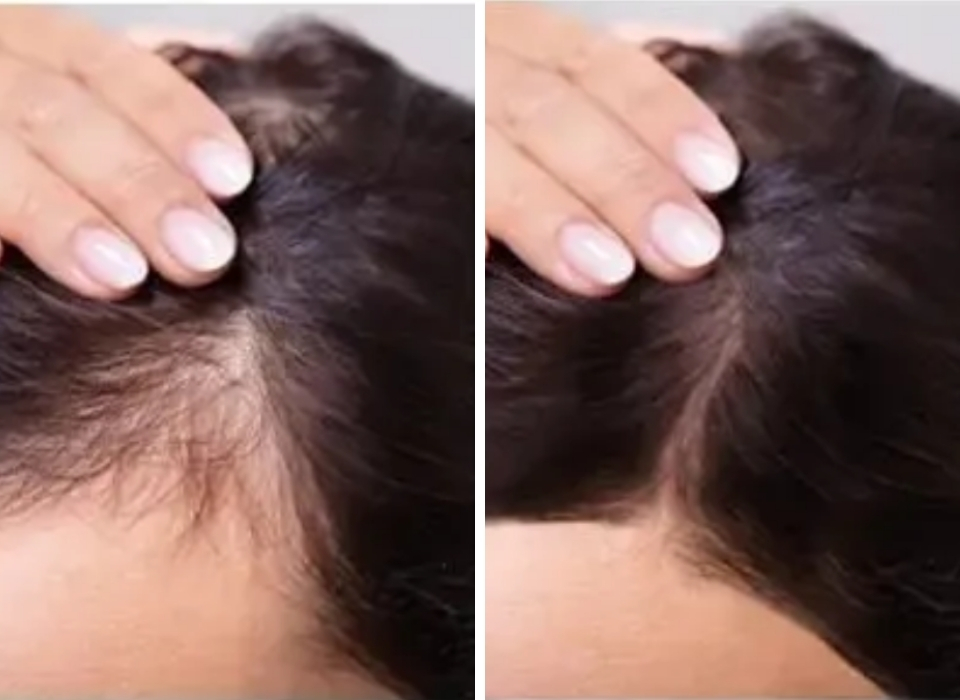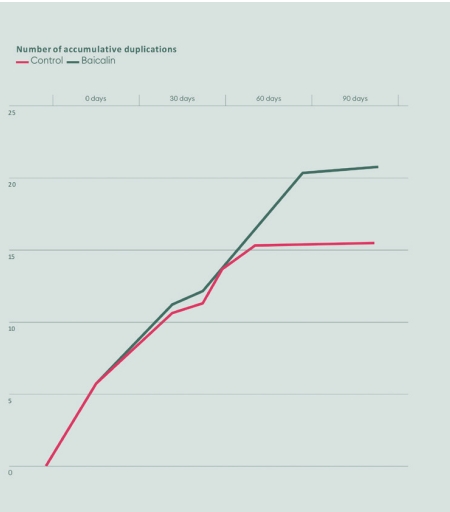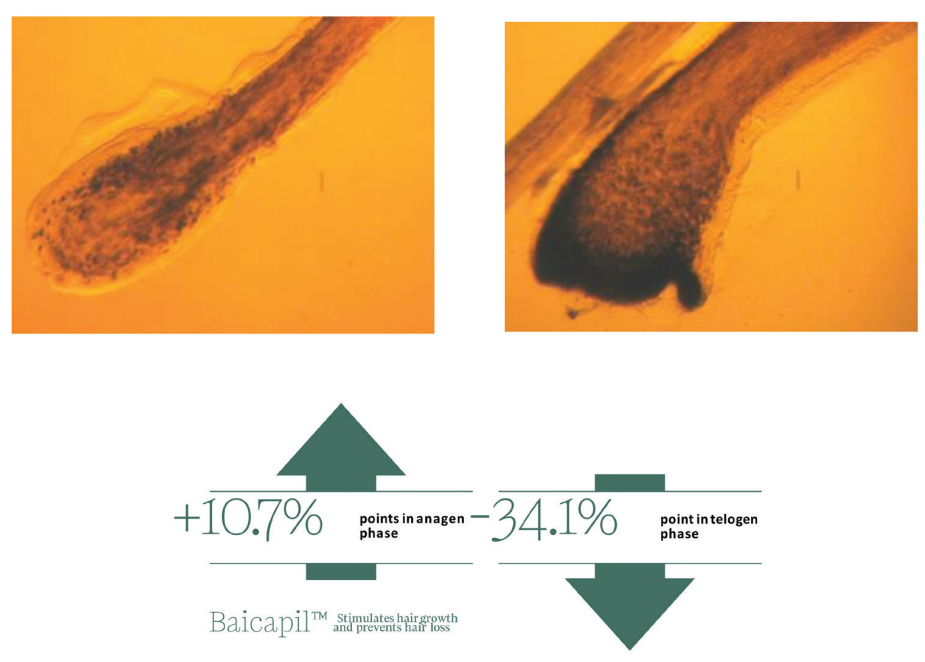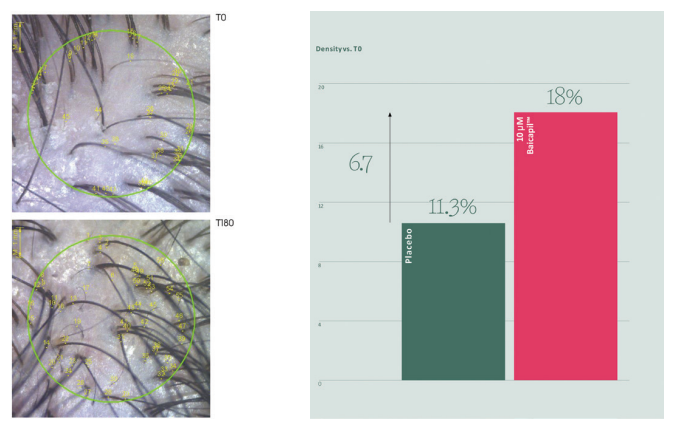
Introduction
Hair loss is a widespread concern affecting millions worldwide, often leading to significant impacts on confidence and self-image. In response to this, Baicapil™, an innovative compound developed by Provital S.A.U., presents a science-backed solution aimed at combating hair loss and promoting hair density. With a formulation based on three botanical actives—soy, wheat sprouts, and Baicalin—Baicapil™ offers promising results in increasing hair density, stimulating growth, and reducing hair loss. Moreover, with its 99.8% natural content, it is COSMOS certified, ISO 16128 compliant and vegan, demonstrating commitment to environmental and ethical values. Here, we explore the science behind Baicapil™ through in vitro and in vivo studies that showcase its efficacy and potential as a key ingredient in hair care formulations.
Composition and Mechanism of Action
Baicapil™ combines three botanical actives: soy and wheat sprouts and Baicalin, a flavonoid derived from the Scutellaria baicalensis plant. These ingredients contribute to Baicapil’s unique properties, working synergistically to promote hair health at a cellular level. Baicalin, in particular, plays a crucial role by enhancing cell proliferation, protecting against oxidative stress, and activating stem cells essential for hair regeneration.

At the cellular level, Baicapil™ functions by delaying cellular senescence, or biological aging, which is particularly important for hair follicles. By activating telomerase, Baicapil™ promotes cell longevity, supporting the hair’s growth cycle and delaying the onset of hair thinning and loss. This dual action— stimulating growth and preventing cell aging—positions Baicapil™ as a powerful botanical solution for maintaining hair health.
In Vitro Efficacy: Cellular Rejuvenation To test the efficacy of Baicapil™ at the cellular level, in vitro studies focused on human skin fibroblasts and mitochondrial cultures. These studies confirmed that the active ingredients in Baicapil™ promote cell activity and delay senescence. Specifically, Baicalin was shown to activate telomerase, an enzyme that protects chromosome integrity during cell division, thereby slowing down aging. In cell cultures treated with Baicapil™, researchers observed increased cell proliferation and metabolic activity. Additionally, Baicalin contributed to a significant increase in the number of cell duplications, indicative of a rejuvenating effect on cellular mechanisms

In Vivo Efficacy: Hair Growth and Density Improvement The in vivo studies on Baicapil™ focused on 61 volunteers over six months, providing compelling evidence of the compound’s impact on hair growth and density. Participants applied a 3% Baicapil™ solution, with hair condition and growth metrics evaluated at baseline (D0), mid-point (D90), and conclusion (D180). Results revealed substantial improvements across several key indicators:
1.Anagen-to-Telogen Ratio: Baicapil™ significantly increased the percentage of hair in the anagen (growth) phase by 10.7%, while reducing the telogen (resting) phase by 34.1%. This shift suggests that Baicapil™ effectively extends the active growth period, leading to thicker and more resilient hair.

2. Hair Density: One of the most notable results was the 22% increase in hair density, with the number of hairs per square centimeter rising from an average of 183 hairs/cm² to approximately 223 hairs/ cm². This increase in hair density reflects Baicapil’s ability to not only reduce hair loss but also stimulate the growth of new hair, resulting in a visibly fuller appearance.

3. Reduction in Hair Loss: Over the six-month study, Baicapil™ demonstrated a significant reduction in hair loss, with participants experiencing up to 60.6% less hair fall. This outcome points to Baicapil™’s potential for strengthening hair follicles and improving their anchorage in the scalp, crucial for reducing hair shedding over time.

Visual Evidence and Consumer Perception In addition to quantitative data, visual assessments in the study provided qualitative evidence of Baicapil’s benefits. Photographic comparisons taken before and after the trial displayed noticeably denser hair, which correlates with the increased anagen-telogen ratio and hair density metrics.
This improvement in visible hair health highlights Baicapil™’s effectiveness as a restorative ingredient in cosmetic formulations. Furthermore, consumers reported a noticeable improvement in their hair’s general condition, aligning with the objective measures obtained during the study.
Cosmetic Applications and Potential Baicapil™ presents a promising ingredient for a variety of hair care products, especially those aimed at consumers seeking botanical and science-backed solutions for hair loss and thinning. Its unique formulation, combining botanical extracts with clinically proven results, aligns well with current trends favoring natural and sustainable cosmetics. Ideal applications for Baicapil™ include serums, shampoos, conditioners, and leave-in treatments, catering to a broad consumer base concerned with hair health and density.
Conclusion: In summary, Baicapil™ emerges as a groundbreaking active ingredient that addresses hair loss through a multi-faceted approach, leveraging the synergistic effects of soy, wheat sprouts, and Baicalin. Its efficacy is supported by both in vitro and in vivo studies, showcasing significant improvements in hair density, growth phase extension, and overall hair condition.
Baicapil™, which is environmentally friendly and ISO 16128 compliant with its 99.8% naturally sourced content and COSMOS certificate, also complies with environmental and ethical values with its vegan formula. With its botanical foundation and robust scientific backing, Baicapil™ stands as a compelling option for hair care brands looking to provide effective, nature-based solutions to combat hair loss and improve hair vitality.
Authors:
Gülden Değirmenci
Technical Sales Manager - Personal Care / Orbiter Solutions
--
Gülbeniz Altınoluk
Application Lab Manager-Personal Care / Orbiter Solutions